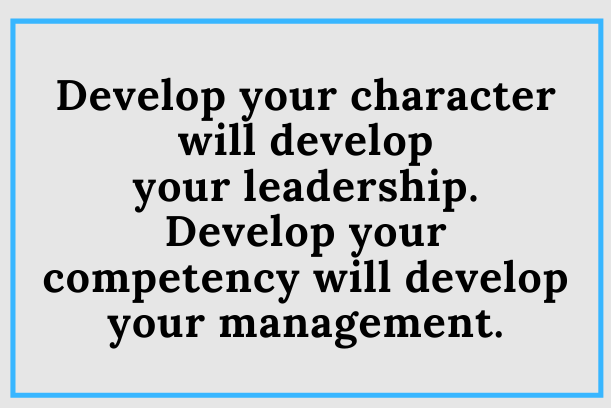Jun25

There are many styles of leadership, and different leadership principles that I discuss throughout my website and my videos. One thing I have learned over the years is, there is not one size fits all. In other words, every individual and team is different. Every circumstance and situation is different.
Just because one principle or style worked with one person, doesn’t mean it is guaranteed to work with the next person. It takes hard work to understand our people, and how we can help them and add value to them.
I have worked with many leaders who said that they made a success of themselves in a previous leadership role. So, they came to work with us thinking they could behave, lead, and treat us in exactly the same way, and it would be another success. How they were wrong.
They didn’t understand that there was not one size leadership style fits all. They thought their new leadership role with us would be a breeze, when actually it was much, much harder than they thought. Some of these leaders learned from their mistakes, and did their best to work hard with us, and help us.
Others were too stubborn, and in the end were removed from their position because they were making things worse.
Organisations are far too focussed on results, when they should be focussing on their people and their culture. When organisations bring in new leaders, their main objective and priority is to improve the results. I am not saying we shouldn’t focus on results, but they should not be the priority.
The people should be the priority. Protecting the culture and living the company values should be another priority of the leaders. Having respect for the people should be another priority. Without respect for the people, there is no way of protecting, or keeping the right culture and environment for the people to work and thrive.
Focussing on processes and results will damage the culture, will damage the environment, and most of all damage the relationship with the people.
The leaders who were stubborn were not willing to let go of what they had learned about leadership, unlearn it, and then relearn new leadership principles that would help them in their situation. They were failing in their leadership of us and their other teams, but were not learning from their failings.

To unlearn, and then relearn something new, that is the mindset of a highly effective leader. You need a strong mindset, and be willing to accept and admit that you don’t know it all. We need to be learning every day. That is why highly effective leaders work on themselves every day.
The mindset of a highly effective leader is to be constantly improving. Their thinking is, if I improve myself, I am making myself more valuable to my team. By being more valuable to my team, I am in a great place to help them become more valuable too.
How valuable to your team are right now? Do you feel that you are adding value to your people? Are you willing to challenge yourself, and work on yourself every day to become more valuable?
There are two principles I would like you to focus on when working on yourself:
You should focus on continuous improvement 20% of the time, and focus on having respect for your people 80% of the time.
Respect for your people is the most important principle, which is why we focus on it the most. It is the foundation of leadership, and will support every other leadership principle that we study, practice, and improve. Highly effective leaders think about respect for the people more often than they think about anything else.
They spend 80% of their time thinking about how to respect their people.
When highly effective leaders focus on continuous improvement, they are working on themselves to become more valuable. By becoming more valuable, they will continuously improve on the value they can add to their team. Continuously improving on their value will in turn make their team more valuable.
Adding value to their team, and helping them become more valuable is how to respect their team. When the team feel respected they will improve. If they feel disrespected, they will not improve. Highly effective leaders spend 20% of their time thinking about continuously improving.
When leaders want to implement new ideas, or bring in a new change, it is imperative that they work hard on influencing their people to buy-in to the new idea or change. What is the best way for them to achieve that? By respecting the people.
If the leader has respect for his/her people, the people will respect them in return, and will buy-in to the new change. If the leader dis-respects his/her people, the people will dis-respect them in return, and definitely won’t buy-in to the new change.
When highly effective leaders want to increase their influence with their team to create buy-in, they must first work on themselves to develop their character, and competency. They focus on developing their character 80% of the time, and they focus on developing their competency 20% of the time.
Developing character is how a highly effective leaders improves how they lead their team, and how much they respect them. Developing competency is how a highly effective leader improves how they manage the processes and policies they have accepted the responsibility for.
Leadership is focussed on people. Management is focussed on processes, policies, and things.
Most organisations provide the training for the people so that they can improve and develop their competency. This is so they can carry out the day-to-day job they were employed to do. However, they don’t provide the leadership development training so that they can improve and develop their character.

This is why you have highly effective managers rather than highly effective leaders.
The leaders of these organisations focus on competency over character. When focussing on competency development more than character development, they are focussing 80 – 90% of their time on continuous improvement, and 10-20% of their time on character development.
May be even less time on character development. They have it the wrong way around.
The leaders of these organisations don’t even think about developing their own character, never mind the people in their charge. It’s an unfortunate fact, but these organisations are prioritising and focussing on the wrong things. This needs to change.
Low performing leaders will tell their people that they are developing them, but they actually aren’t. They manipulate their people to get what they want by telling them, “This task is part of your development.” When actually, it is a task that they have done many times before, or has nothing to do with what their team is about.
They manipulate their team for very selfish reasons. They do not think about how their team thinks or feels.
To be a highly effective leader, you must increase your influence with your team. To increase your influence you must develop your character, and you must also develop the character of each of your team members, so that they can increase their influence.
You must also help your team to develop their competency so that the processes improve along with the people. To be a highly effective leader, you must become a highly effective leader. Focus 80% on character development, 20% on competency development.
The more character you develop, the more respect you will have for your people. The more respect you have for your people, the more character your people will have. Remember, to grow your people, you must grow yourself.
What is your business about? People, things, or results? Focus on the things, you are not developing your people, and not producing results.
I welcome hearing how this post has influenced the way you think, the way you lead, or the results you have achieved because of what you’ve learned in it. Please feel free to share your thoughts with me by commenting below.
All the best,
By Tom Lawrence
Keywords: Culture, Leadership, Transformation
 The Orchestra Needs a Conductor: Why Multi-Model Agents Require H2E Governance
The Orchestra Needs a Conductor: Why Multi-Model Agents Require H2E Governance The Role of Memory in Modern-day Business
The Role of Memory in Modern-day Business The Architectures of Permanence: A Comparative Analysis of the "Big Three" AI Strategies (2026)
The Architectures of Permanence: A Comparative Analysis of the "Big Three" AI Strategies (2026) Friday’s Change Reflection Quote - Leadership of Change - Change Leaders Enable Generational Advancement
Friday’s Change Reflection Quote - Leadership of Change - Change Leaders Enable Generational Advancement The Corix Partners Friday Reading List - February 27, 2026
The Corix Partners Friday Reading List - February 27, 2026